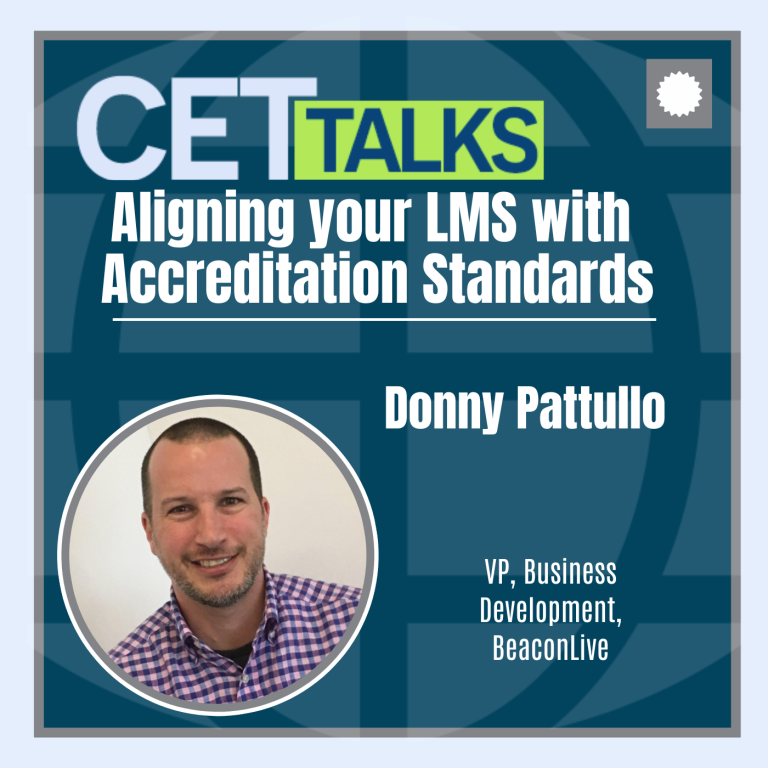Episode 06
.
CET Talks: Accreditation, Learning and Leadership
Episode 06
AUGUST 24 2023 . 29 MINUTES
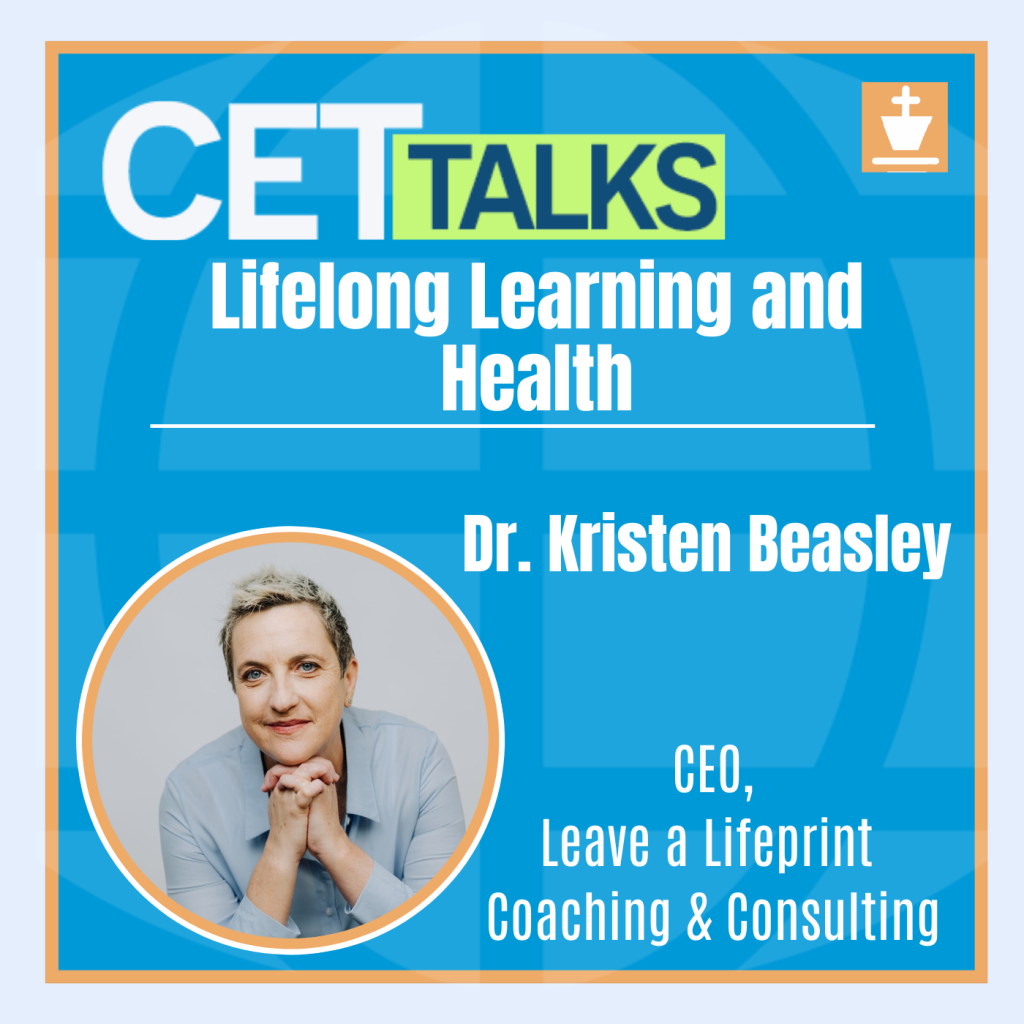
Lifelong Learning and Health
Randy Bowman, Interim President and CEO of IACET, and co-host, Mike Veny, CEO of Mike Veny, Inc., an IACET Accredited Provider, sit down with Dr. Kristin Beasley, clinical psychologist, trainer, speaker, and certified IPEC Coach. Dr. Beasley is also CEO/President of Leave a Lifeprint Academy, an IACET Accredited Provider, and in the episode, she reveals why she decided to pursue accreditation and the one thing she wishes she had known prior to starting the accreditation process. She also discusses details about her unique training model and how things have changed for the people she served since becoming accredited.
Listen to the Podcast
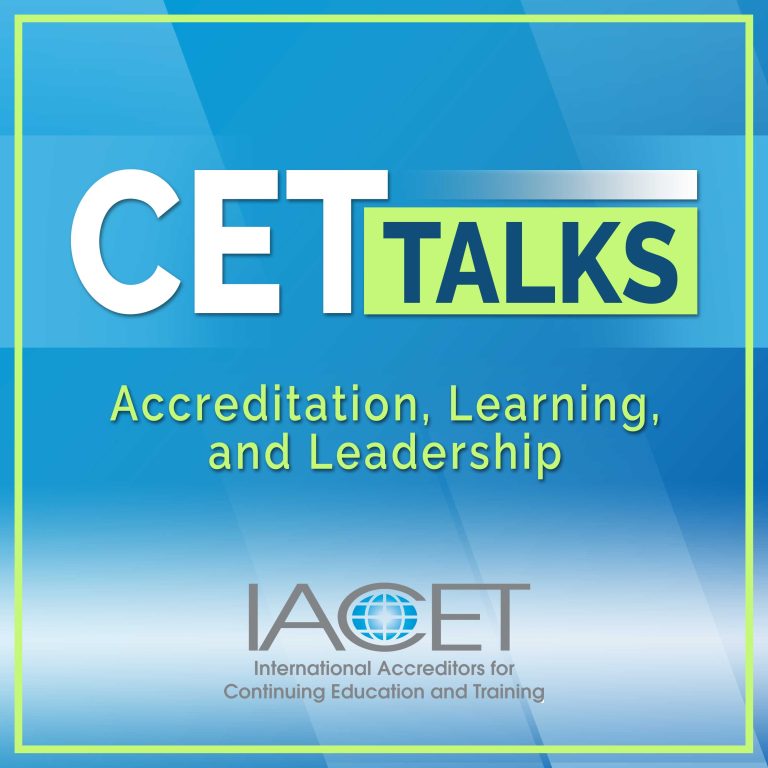
Welcome to CET Talks, the International Accreditors for Continuing Education and Training’s podcast, where we convene thought leaders in the continuing education and training ecosystem to share ideas, research, best practices, and experiences that promote the creation of a world that learns better. Your hosts are Randy Bowman, Interim President and CEO of IACET, and certified corporate wellness specialist Mike Veny.
Randy Bowman, Interim President and CEO of IACET, and co-host, Mike Veny, CEO of Mike Veny, Inc., an IACET Accredited Provider, sit down with Dr. Kristin Beasley, clinical psychologist, trainer, speaker, and certified IPEC Coach. Dr. Beasley is also CEO/President of Leave a Lifeprint Academy, an IACET Accredited Provider, and in the episode, she reveals why she decided to pursue accreditation and the one thing she wishes she had known prior to starting the accreditation process. She also discusses details about her unique training model and how things have changed for the people she served since becoming accredited.

Transcription
Host: Welcome to CET Talks, the International Accreditors for Continue Education and Trainings podcast, where we convene thought leaders in the continue education and training ecosystem to share ideas, research best practices, and experiences that promote the creation of a world that learns better. Enjoy the episode.
Randy Bowman: Hi, and welcome to CET Talks. My name is Randy Bowman, and I’m here with my co-host, Mike Veny, a certified corporate wellness specialist and CEO of an IACET-accredited provider. He just recently returned from vacation, and does he look well rested and relaxed?
Mike Veny: Yes. I got back from vacation, and I look well rested. If you’re listening to this, you can’t see me, just imagine that I look well rested. My name is Mike Veny, and I am the CEO of an IACET-accredited provider, Mike Veny, Inc. and one of the areas we specialize in is mental wellness. Today I’m really honored to have a very special guest who’s a friend and a fellow CEO of an IACET-accredited provider, Dr. Kristen Beasley, known as Dr. B. I want to tell you a little bit about today’s guest. Dr. B is the CEO and president of Leave a Lifeprint Academy, an IACET-accredited provider. She’s also a clinical psychologist, trainer, speaker, and certified IPEC coach, which stands for the Institute for Professional Excellence and Coaching. And most importantly, she is a dog parent. Dr. B, it’s so nice to see you, and welcome to our show.
Dr. Kristen Beasley: Thank you. It’s so nice to see you, too. Hi, Randy. Hi, Mike. It’s great to be here. Thanks.
Randy Bowman: Thank you so much for joining us today, Dr. B. Just to kick us off and get us started, why don’t you tell us a little bit about you, who you are, what kind of coffee you drink, unless that’s a security question for your bank, at which case, feel free to keep that private.
Dr. Kristen Beasley: All right. Interestingly, I don’t drink coffee, but don’t be too rattled. I do get caffeine through unsweetened iced tea. That’s my morning drink, first thing out of bed, lots of ice and dark tea. I am a dog parent, so my two dogs are working with me right here at the foot of my desk. I am a speaker, I’m a coach, I’m a trainer, I’m a consultant, all around mental health in the workplace and also in people’s personal lives, as well. I also create on demand and online, either live or virtual on demand, live or virtual training or classes that are related to workplace changes related to mental health. So that’s my story. And I am an IACET provider. I’m IACET-accredited, which is always important when you’re training or teaching people something, so that they know that it’s got heart and meat to it.
Mike Veny: I like that. I know you and I have spoken about this extensively, but our listeners and Randy haven’t heard about this. What made you decide to pursue IACET accreditation?
Dr. Kristen Beasley: Accreditation is key, in terms that it holds people accountable to their education and training. Accreditation has been part of my career base as I’ve been in education for 30 years, and not necessarily IACET accreditation, but this is the accreditation that’s related to the work that I do now. However, accreditation in general sets a standard of quality and process for training and education. In order to provide CEUs linked to my courses and the work that I do, I wanted it to have that stamp of accreditation that says we didn’t just throw this together willy-nilly; we took it very seriously. We followed the standards related to delivering quality education with outcomes and a purpose.
Randy Bowman: I love how you said it; it holds people accountable. And holds people accountable to a higher up or to their learners, but also holds ‘them accountable to themselves. As a CEO, you’re accountable to yourself, and I love that you think you’ve pursued accreditation for that. What kind of programs do you have that give CEUs, and what do they look like?
Dr. Kristen Beasley: Every webinar we do and every training program we do is linked to CEUs. However, the primary training we do right now is called TICR; it’s Trauma Informed Care and Resilience. There are three modules that are certifiable, so people can become trauma-informed care certified, which is very important for people in all sorts of industries, whether it’s mental health, whether it’s healthcare, whether it’s policing, firefighting, whatever it is. Understanding trauma and resilience and how resilience weaves into trauma are all very important. There’s the module one and then there’s module two, and then there’s module three. That’s really the heart of my program, I would say, because resilience is so much of my passion and work, and talking about trauma goes hand in hand with talking about resilience. This is our baseline stellar program that is three modules, and that’s on the LMS on my website, the Leave a Live Print Academy. People can go there and get certified, to really beef up their depth of understanding around the work they do. It helps people to integrate these mental health concepts into the regular work they do, whatever that is, even just being a boss or a manager or a leader in any way.
Mike Veny: Dr. B, I’m just going to go on record as saying, I think you’re doing some great work in the world, and I’m really glad that you’re here and sharing this with us. I know that you and I met around the time that both of our organizations got accredited. I want to ask you this, for the organization that’s listening right now that might be interested in going on this unique accreditation journey, what is one thing that you now know that you wish you would’ve known prior to starting the accreditation process?
Dr. Kristen Beasley: Wow. What did I wish I had known prior? Good question. It’s a big task. It is a big task, but it’s absolutely valuable and worth it because like I said earlier, it does hold me accountable as a business owner. It really does require, Mike, as you and I know, to check the boxes to make sure that you do not miss anything that is important in the process of delivering education and training to people on a professional level, in a professional venue. I think that what I didn’t know was…no, I knew it was going to be hard. I knew it was going to be a big, huge job, but it was totally worth it. I think in the grand scheme of things, that’s probably what I didn’t know was I was going to meet some really amazingly fabulous people through IACET all over the country. So, I think in that sense, that’s true for my business in general, but IACET really opened that door because it is an international organization, and so people recognize the name IACET. I didn’t really realize how many people I would meet all over who knew what accreditation meant through IACET.
Randy Bowman: Man, that’s good to hear. I’m glad that it opened some doors for you there. Every training provider is different, and I think that’s one of the things that makes IACET unique is that we are industry agnostic. But, you have your own unique training model. Can you tell us a little bit about that, and what makes it different from some of the more popular models?
Dr. Kristen Beasley: I would say that my training module, or my training strategy, is to funnel down to normalize mental health across the board through a large group of people, in very simple, relatable terms. I can do that by training a large group of people in an on-demand class because we’re not getting into the nitty gritty. But then, sometimes we do, but we can move that down by providing live training, and we can move that down into small group, really specialized training for a particular organization where that’s actually personalized training for that particular company and industry. From there, if there are leaders or executives or other people who want specific coaching, we can take that information that we’ve gone from really broad level down into the nuts and bolts of how that can work into making it actionable and applicable to somebody’s real life day-to-day experience. As we’re all experiencing this massive transformation in the workforce, let’s not forget that the world has fundamentally changed, and it is never going back to what it was pre-pandemic. We are in an absolute workforce transformational crisis. It’s literally called a crisis of the era. The world is changing. The way we do business is changing. The way we handle money is changing. And if everybody who has experienced somebody saying, Oh my gosh, does it feel like everything is upside down?” Lots of people are feeling that way. That is not a coincidence. That is historical. That is a hundred year cycle transition that has happened post pandemic for the last three pandemics over 300 years. So, we are not experiencing something that is new. It’s only new to us because we haven’t understood, necessarily, because it’s a hundred year cycle. If you don’t live that long to experience it and watch it, you’re not recognizing that history repeats itself. So, that is where we are. There’s going to be a very fundamental takeover—I’ll call it a takeover—by our young, our growing up millennials who will be taking the helm from our retiring, leaving-the-workplace Baby Boomers. Then follow that up with our much more quiet leaders in the Gen Z group. That’s another piece that I’ve actually moved into, is teaching organizations about how to understand their employees related to their generational status, because it’s so important. It plays a role in their everyday business because young people will not stay at work if their companies do not honor and respect and illustrate their values, which is a very big difference. That’s a very big change. In 50 years, people worked because they had to work. Today, you don’t share my values, you spend your money on things that I don’t believe in. Bye, I’m gone. That is not uncommon. That is literally the norm today. Ask anyone under the age of 27 if they’ll work for a company that does not respect their values or appreciate their values. Nope. My own son quit his teaching job, not necessarily because of values, but it wasn’t a match for him. He knew it and he changed jobs, and I knew it would be fine. He’s a Gen Z, but he quit before he even had another job, which would be unheard of for a Baby Boomer or a Gen X’er. If we understand the generational trajectory and how this works, then I could sit back and say, all right, calm my own nerves. I know who he is. He will handle this, and he totally did. He took it on himself, found a job that was a good match for him. He made that decision based on what was good for him, which made me really very happy as a parent that he prioritized his mental health, physical health, his happiness at work over his job, even though his job is in education. I was very proud of him for making that decision and being able to recognize his needs as a priority and then executing that shift.
Mike Veny: And hopefully all the parents out there are listening to what was just said. Thank you so much for sharing that. Randy, what are your thoughts on standards?
Randy Bowman: One of the things that we like to say about the IACET standard is that it’s descriptive, not prescriptive. It allows accreditation of all kinds of different industries, all kinds of different models, but even that can be challenging. What challenges did you face in showing adherence to the standard while still staying true to your unique strategies?
Dr. Kristen Beasley: Prescriptive and descriptive. I think that was a learning curve for us, that we had to learn both how to be descriptive and prescriptive at the same time in the work that we were doing. IACETs support through the process of accreditation is really helpful in helping businesses home in their own understanding of what their coursework is going to be like. For me, because my coursework is not industry specific, it does fall under mental health, but at the same time, you can get certified in any industry, it doesn’t matter. I think that was just a big learning curve. The bonus was that IACET, in the accreditation process and going through the steps, was very helpful in walking us through understanding that and how to hone that in for ourselves.
Mike Veny: Since your company got accredited by IACET, how have things changed for the clients that you serve?
Dr. Kristen Beasley: I think that’s a multi-layer question. Because I became accredited with IACET, I feel like we started talking about trauma and resilience. We were coming out of a pandemic, so everybody was traumatized. It was this imperfect storm, I like to call it. Everybody was very receptive not only to the topic, but also to wanting to hear from an accredited provider in terms of making sure that the information was accurate and getting trauma informed or understanding mental health in the workplace. All of a sudden everybody’s awake and wants to know, “Oh my gosh, what do I do at work?” Around all these issues that are related to quote unquote “unsettling trauma”. Civil unrest, as well as pandemic political transitions, there’s so many things going on at work. I think that since I became accredited, since the pandemic kind of opened up, technically ended July 8th, 2022, that’s the date on the news, I’m out in the world a lot more again. That’s one of the things I get called about, and I’m speaking all over the country now, where people are very interested and receptive and want to talk about not only trauma, but really what they want to talk about is resilience. They want to talk about how to move through these next waves of transition after such a huge unknowing. Nobody can really explain what’s coming next, so it’s very refreshing to have somebody who comes in and talks about resilience and overcoming adversity. Even though I don’t have all the answers, I certainly do live in the world of, hello, my podcast, Delusional Optimism. I think it makes people feel a little bit better about what’s coming because even though it feels very doom and gloomy, I feel very delusionally optimistic about it. I do trust our littles. I trust our younger generation so much, and I know that it’s going to be okay, even though the transition is hard.
Mike Veny: Now that I have a psychologist on the show, and even though she’s not being billed by the hour, I’m going to ask a mental health question. I’ll buy you coffee when I see you for this. Alright, tea. In your mind, how is continual learning related to mental health? You talked about the era that we’re in, in resilience and trauma. How is continual learning related to good mental health nowadays?
Dr. Kristen Beasley: I think continual learning has always been related to good mental health and mental hygiene. There’s just no way around it. When you have continual learning, we have activity going on in the brain, and we need activity going on in the brain in order to feel alive and to feel healthy. If we’re stagnant and we’re not learning anything new, then that sort of parallels a depressive state, because we’re stagnant in our mind. We’re not moving forward. We’re not learning anything new. We’re not exploring things, we’re not curious, we’re not firing. Our brain isn’t firing, so it’s not rewiring where we learn new things. That is even more exhausting than doing the work of learning. Learning comes naturally. Humans are driven towards finding out new things. That is how we exist and survive in the world. So, lifelong learning is really what everybody is innately wanting and driven into. It’s just that we have to provide access to people learning, one, accurate information. It has to be accurate. Now we’ve got all this stuff going on; AI, we’ve got fake news, we’ve got all sorts of stuff going on, but people want to learn. We have to give people opportunities. We’ve just come out of a period of time where everything stopped; the normal way of learning things stopped. Now we’re in the restart mode, and I don’t think that it’s really about people not wanting to learn. It’s that they have to have accessibility. The one thing I think post pandemic that’s so important is that we became so much better at doing things virtually and online and on demand and being able to connect with people all over the world and all over the country in ways that we didn’t do before. We were so uncomfortable that then we just finally had to force ourselves to get comfortable with it because it felt like it was never going to stop. Now that it has stopped, we’re just better at connecting through Zoom. Now we’re making the full wave of adjustments because people like being remote. This is one of the things that businesses and industries are facing is, “Wait, we thought everybody would come back.” “No, you need to call me, because I’m going to help you figure out how to let people work remotely, but also be very productive, and efficient, and sometimes come to work, because it is good for people to have interactions.”
Randy Bowman: I have really enjoyed listening to this past answer, and I’m so excited that you’re going to be presenting at our keynote address at the upcoming 2023 IACET annual conference. Without giving away the keynote, what do we have to look forward to? What are you going to be sharing with us?
Dr. Kristen Beasley: Well, first, thank you very much for having me, and thank you so much. I’m so excited to be the keynote at in St. Louis, coming up in September. I think I probably already gave it away because my heart and soul is resilience. We’re definitely going to be talking about resilience, but I’m not going to tell you how it’s going to be delivered. That’s always the bonus. The delivery is the experience. So, it’s not so much about the information as much as it is about how it comes to and through you.
Randy Bowman: Awesome. Oh, I’m so excited. It’s going to be fun. Thank you. So, we ask every one of our guests this question because it’s the core of who we are. IACET is here to create a world that learns better. So what does a world that learns better look like to you?
Dr. Kristen Beasley: I love this question. A world that learns better. A world that is open to learning better is a more equitable world, is a more diverse world, is a world that says, “Oh my gosh, I didn’t even know that before. Thank you so much for teaching me this new thing!” And so now if somebody says, “Oh my gosh! That was a thing? I didn’t even know that. And now I do”. A world that is open to learning is a much more equitable world. It’s a more malleable world. It’s flexible, it’s adaptable. Then it launches us into the future because we are here, we are at the point of transition into a new kind of a future. That new future is going to be determined by the learning of today. One of the things that we know, our Gen Z’ers are racially and ethnically more diverse than any generation has ever been in history. The beauty is that as they launch us into the future, we are already primed, and ready to be a more equitable, diverse world. Now we just have to learn that we can do that and that’s important. That is the most important thing going forward, is that we have equality across all marginalized groups. I’d say that learning is what makes us better people, all the way around better human beings, and a better species, and more resilient. And it builds our littles, makes them safer all the way and happier, because we want them to be happy.
Mike Veny: Thank you so much for sharing that. Thank you for delivering an engaging interview. And actually, I’m going to say this wasn’t an interview. I’m going to speak for Randy. You shouldn’t speak for other people, but I’m going to do it. This was a transformational experience for us today, and I hope for those of you listening, it was for you, as well. Randy, I just wanted to tell you about my takeaway. I got a takeaway that I did not expect to get. I learned so much. I took a lot of notes from Dr. B, and I just went to her website, and I enrolled in all three of her courses. That was my takeaway; you just need to do this, Mike. So what about you, Randy?
Randy Bowman: My takeaway is I love the idea that making learning accessible is a key to allowing people to be their true selves, who they’re already aligned to be and created to be. Because that’s doable, making it accessible is doable. If there’s a blockage, we can remove it. So that’s my takeaway. Yeah, for sure. If you enjoyed hearing from Dr. B today and want to get more from her and lots of other great content, you’re going to want to come to our 2023 annual conference happening on September 13th and 14th at the Royal Sonesta Chase Park Plaza in St. Louis, Missouri. Mike is going to be there. I’ll be there. Of course, Dr. B is going to be there. You can find more information about how to register on the website, www.IACET.org. And if you do come, make sure you pop over to Mike and I and tell us you heard us on the podcast.
Mike Veny: Yes, that would make us feel good. And as we head out today, I want to ask you, our listeners, to tell us about a course or professional development event that impacted your mental health in a positive way. We’d love to have you find us on LinkedIn or on Twitter @IACETorg and share your thoughts. Don’t forget, you can submit topic ideas, suggestions for guests, and other feedback on the CE Talks podcast page of the IACET.org website. We certainly hope you’ll subscribe to this podcast on your favorite podcast platform, so you don’t miss any episodes. Thank you so much for joining us today.
Host: You’ve been listening to CET Talks, the official podcast of IACET. Don’t forget to subscribe to the podcast on Spotify, Apple Podcast, or wherever you listen to podcasts. To learn more about IACET visit IACET.org, that’s I-A-C-E-T.org. Thanks for listening, and we’ll be back soon with the new episode.
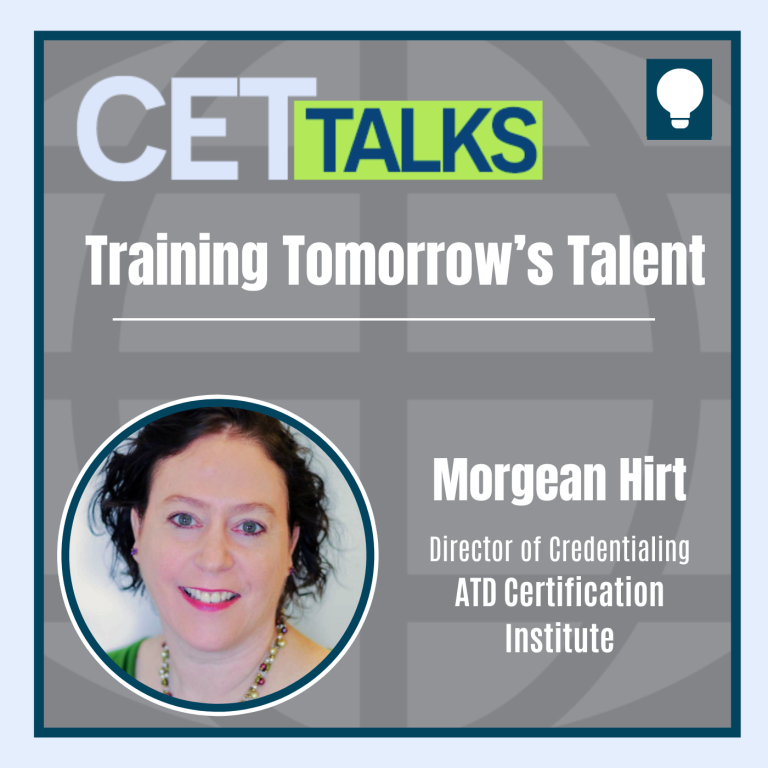
Episode 31: Training Tomorrow’s Talent: Exploring Certification, Standards, and Impact with ATD’s Certification Institute
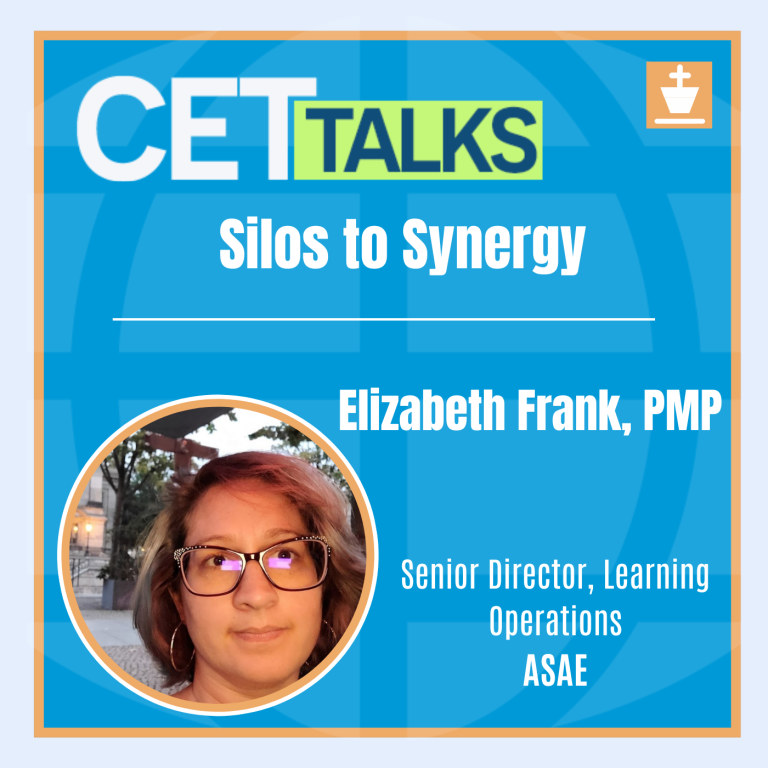
Episode 30: Silos to Synergy: Holistic Approaches to Creating Collaborative Learning

Episode 29: Credentials in Crisis: Challenges and Opportunities in Modern Education Recognition
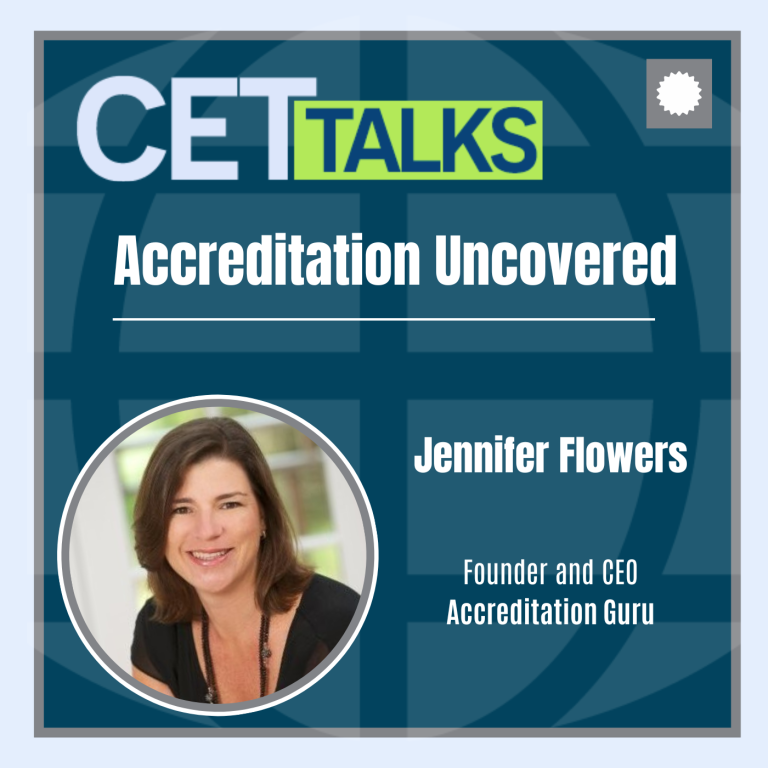
Episode 28: Accreditation Uncovered: Essential Insights from an Industry Leader
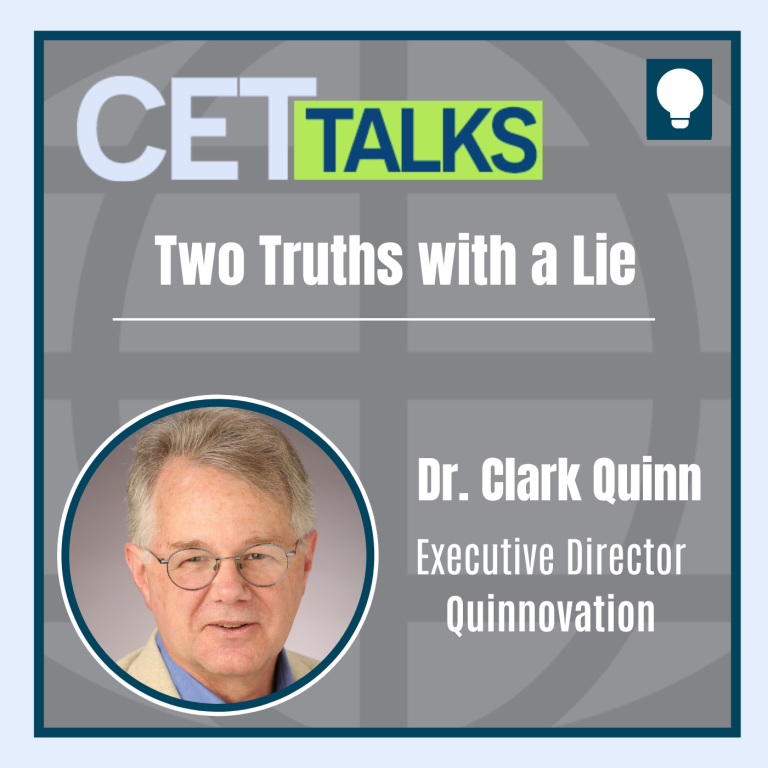
Episode 27: Two Truths with a Lie: Managing the Myths of Modern-Day Learning
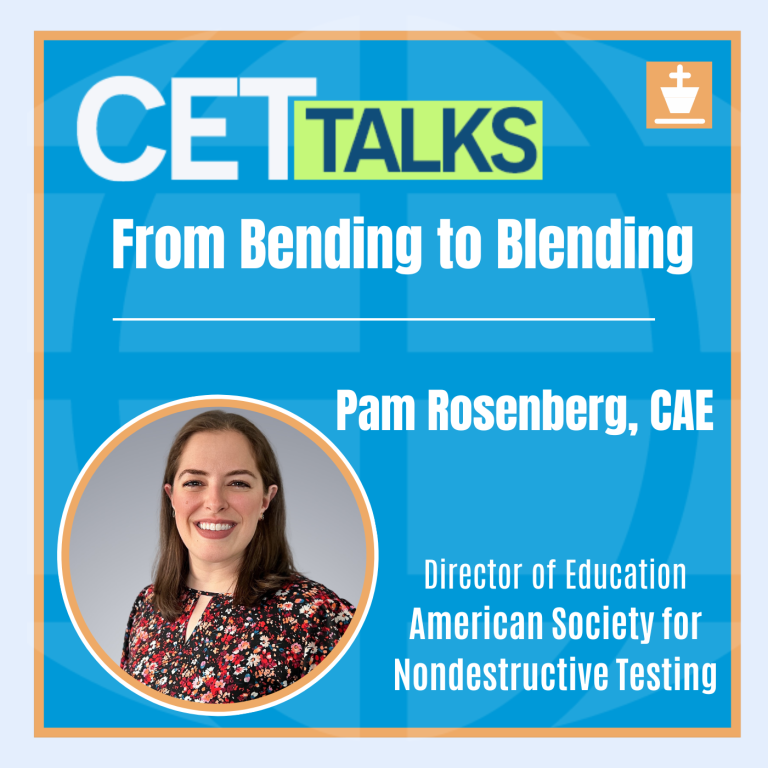
Episode 26: From Bending to Blending: Best Practices in Integrating Externally-Created Content
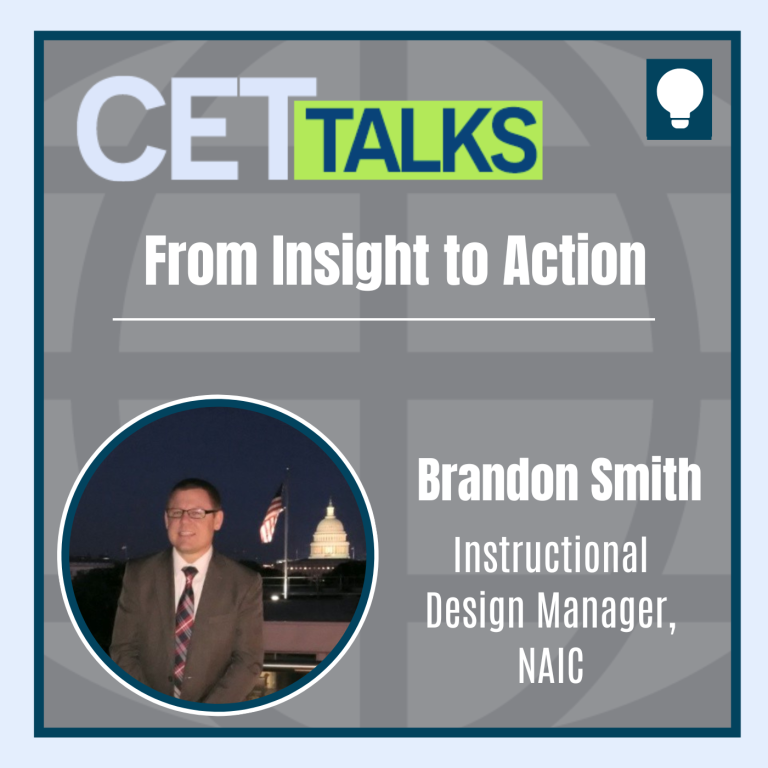
Episode 25: From Insight to Action: Charting the Career Path of a SME-turned-ISD
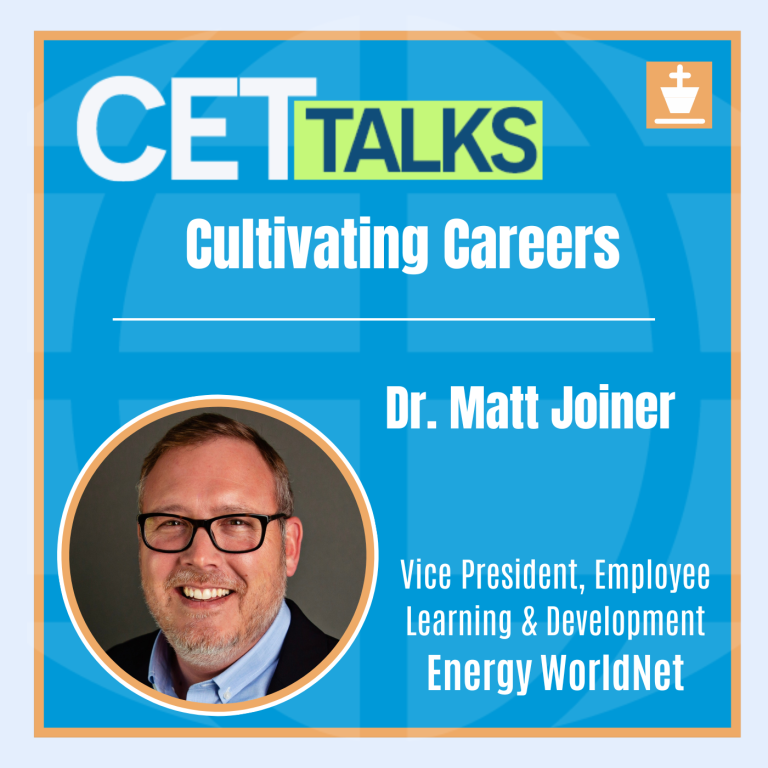
Episode 24: Cultivating Careers: The Power of Employee Engagement for Organizational Success
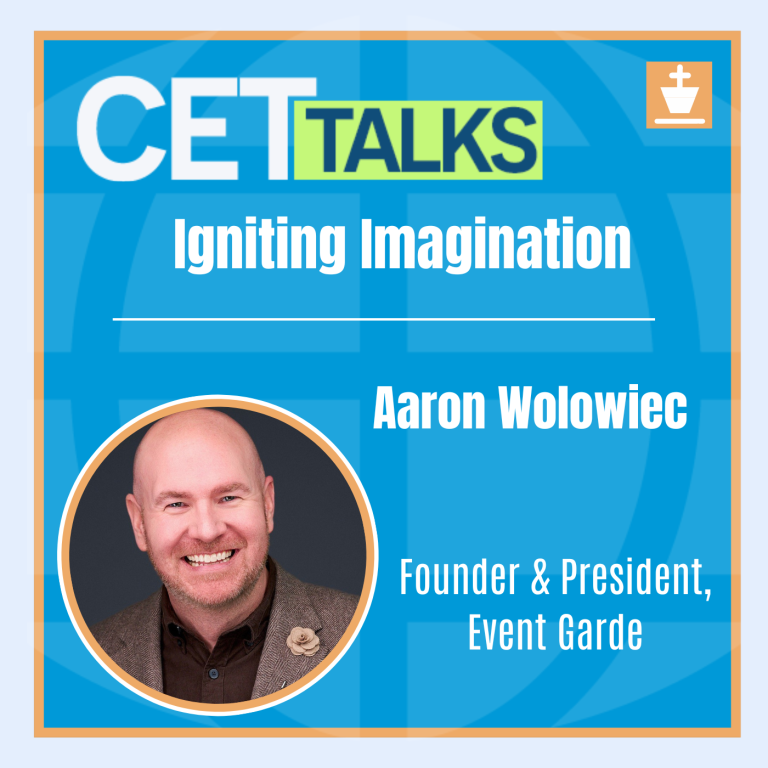
Episode 23: Igniting Imagination: Crafting Creativity in Training Environments
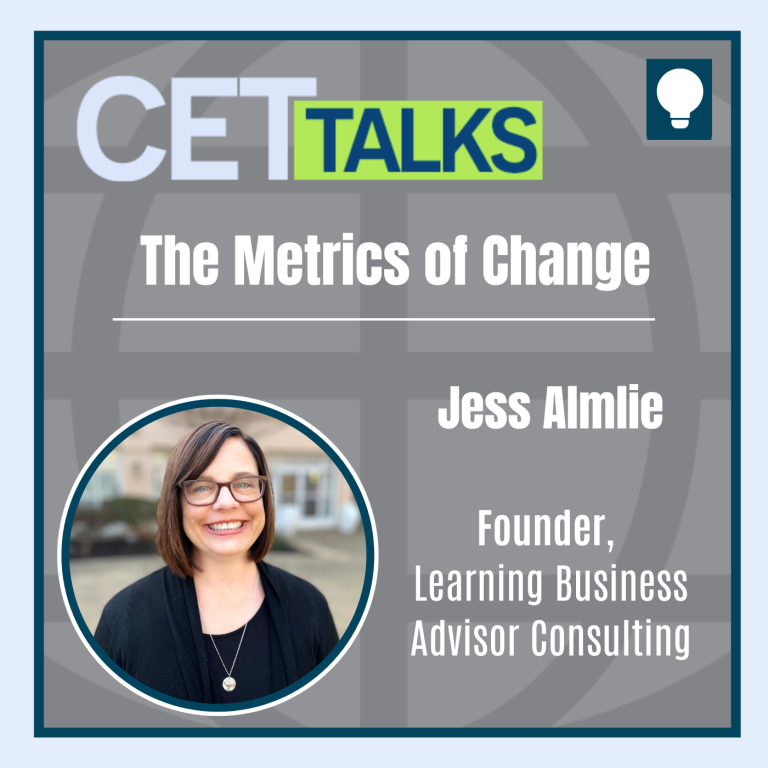
Episode 22: The Metrics of Change: Navigating Purposeful Measurement in L&D
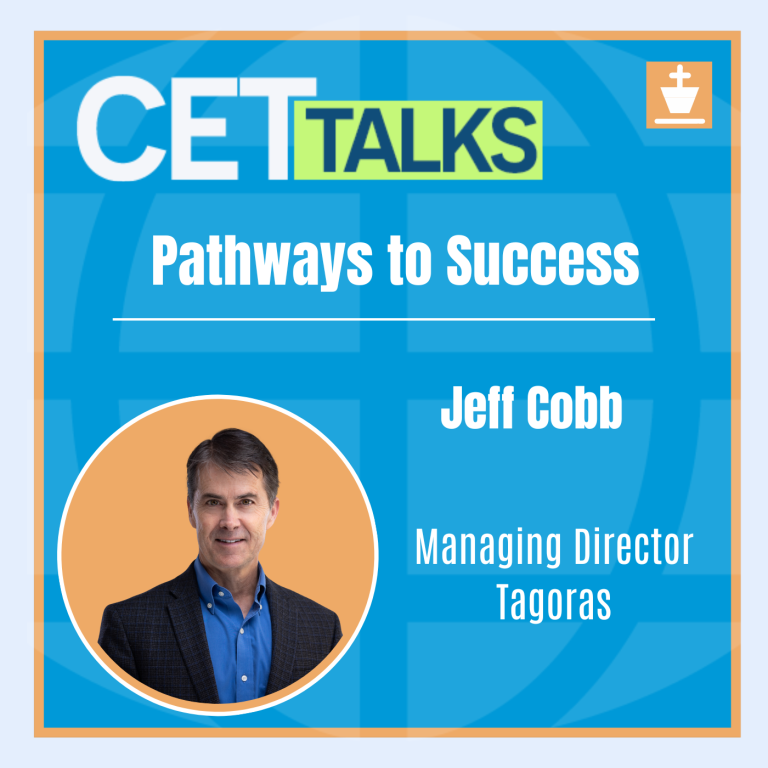
Episode 21: Pathways to Success: The Value of Lifelong Learning through Digital Credentials
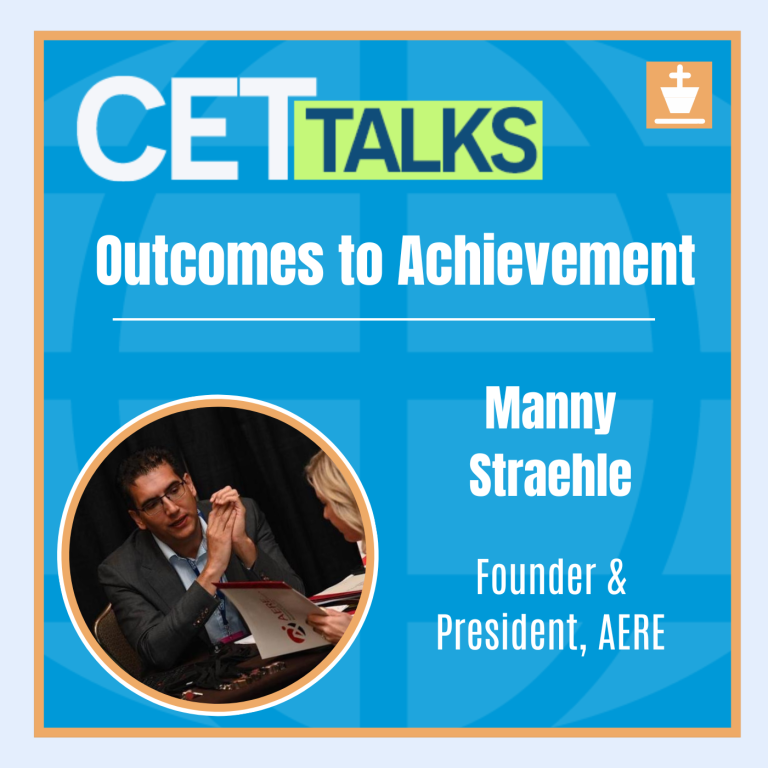
Episode 20: Outcomes to Achievement: Crafting Tomorrow’s Workforce Through Competency Models
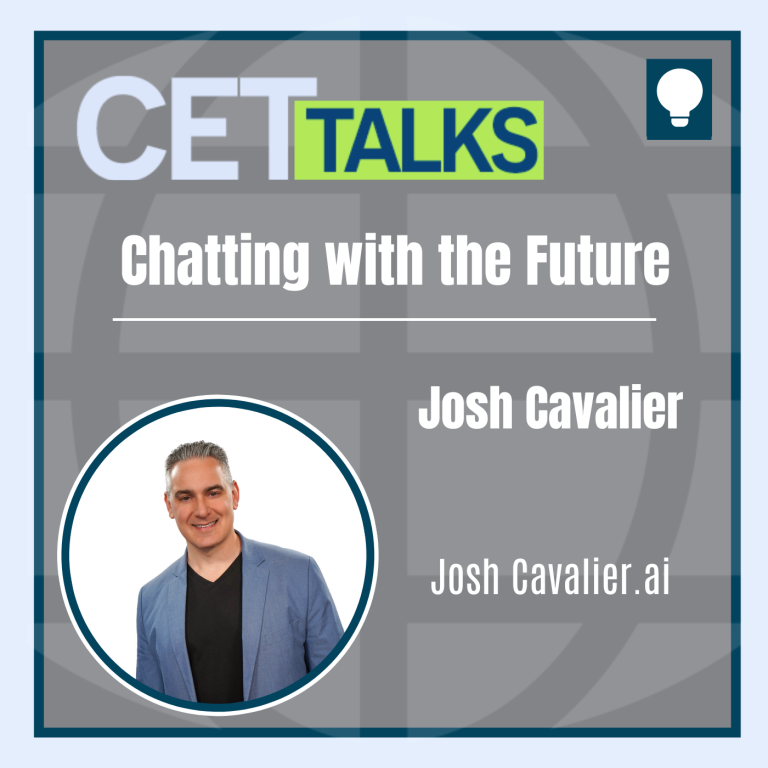
Episode 19: Chatting with the Future: Enhancing AI Output Through Prompt Engineering
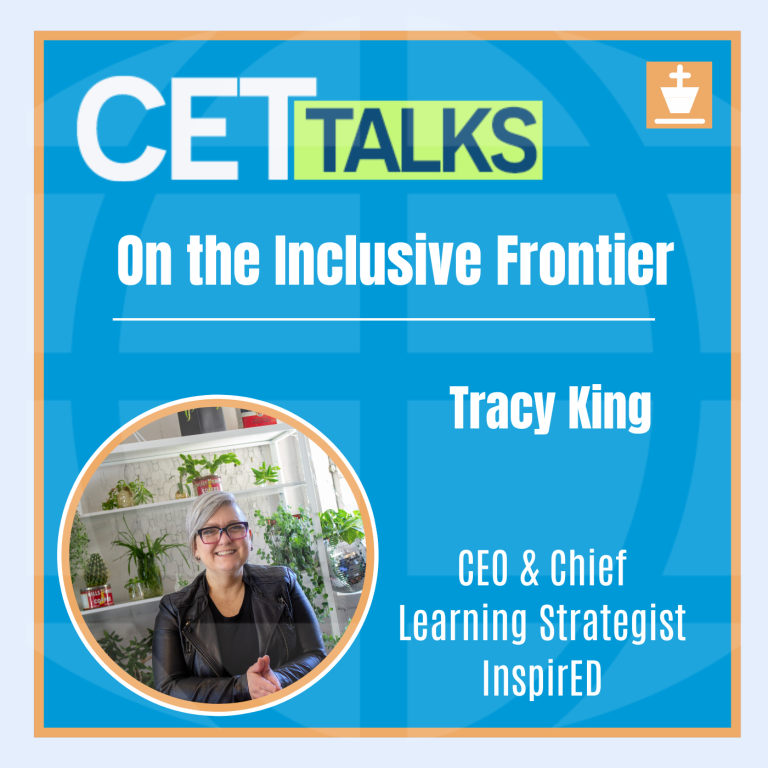
Episode 18: On the Inclusive Frontier: Harnessing Neurodivergence in Modern Training

Episode 17: Designing with Purpose: Strategies for Accessible e-Learning Development
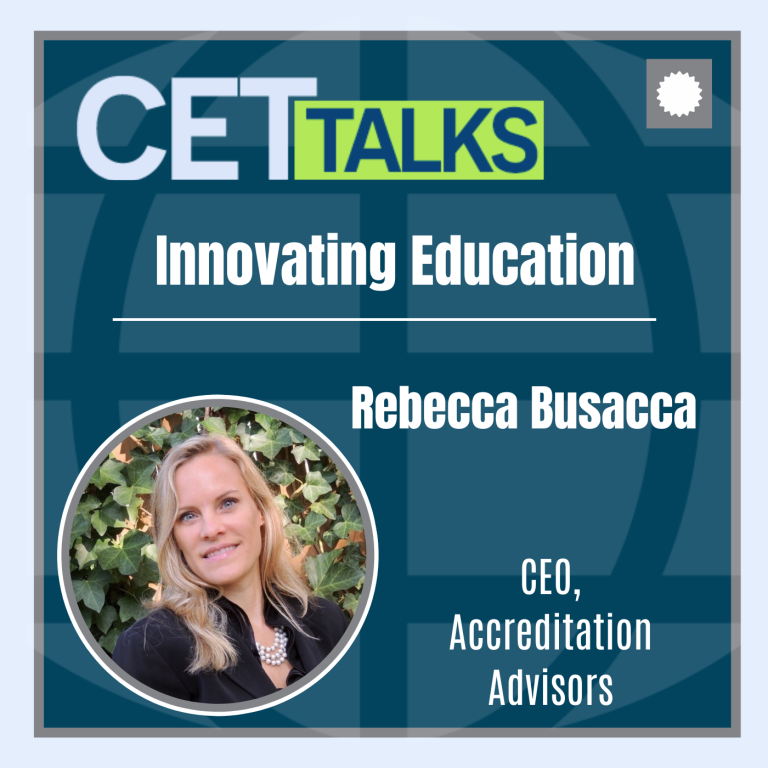
Episode 16: Innovating Education: Navigating Accreditation for Short-Term Training
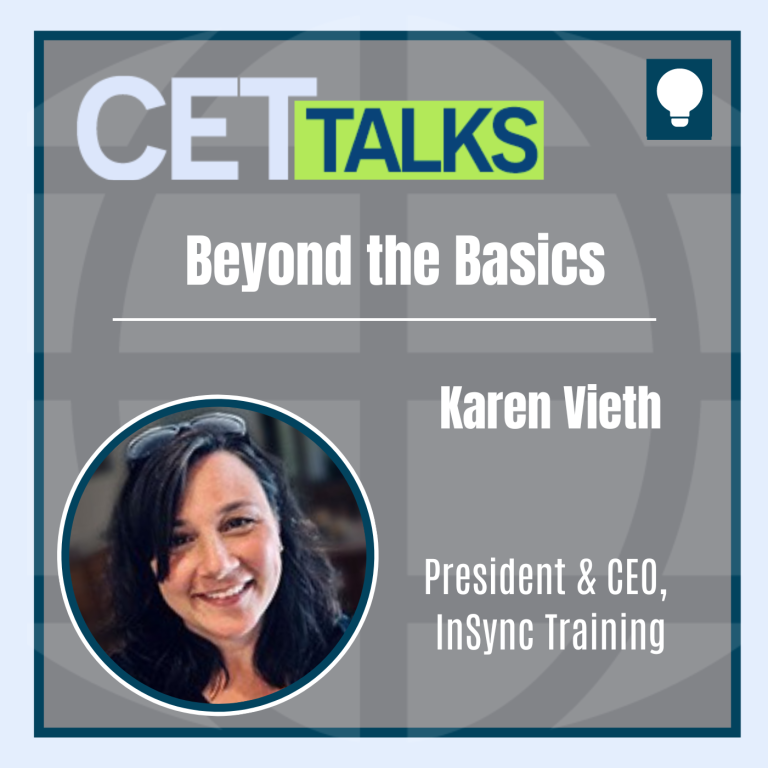
Episode 15: Beyond the Basics: Elevating Virtual Training through Expert Facilitation
